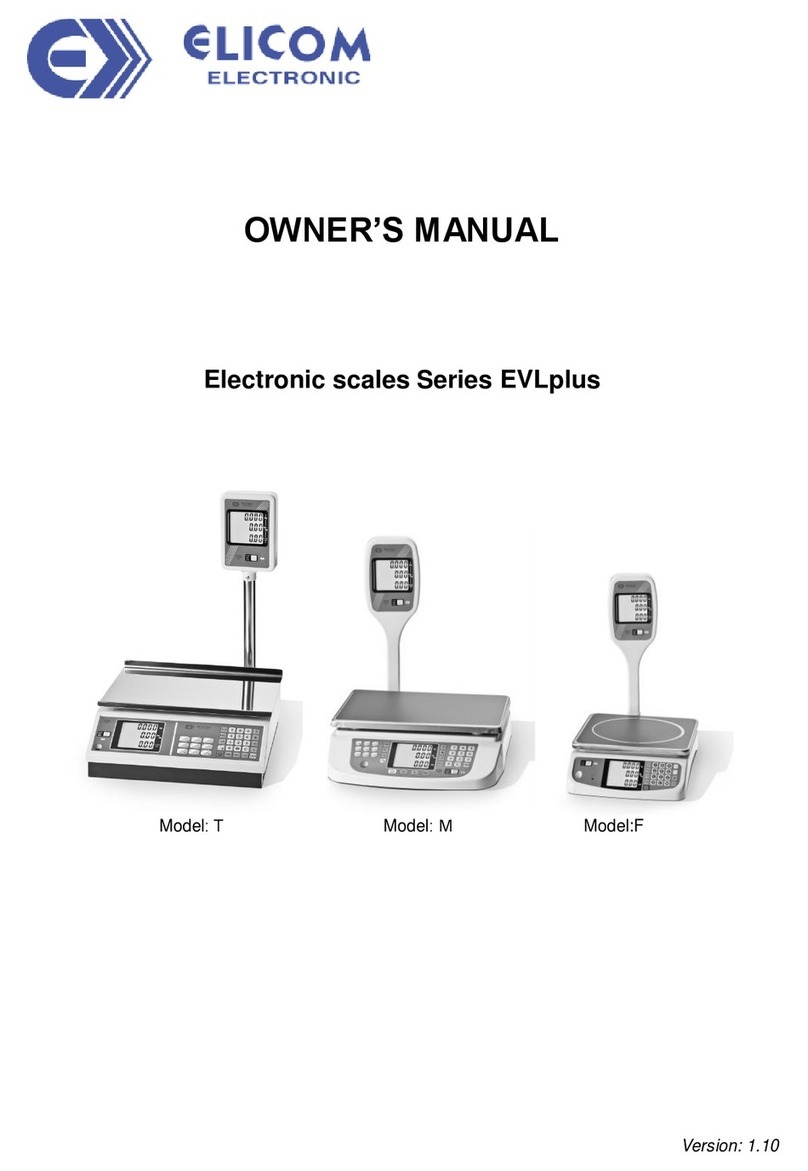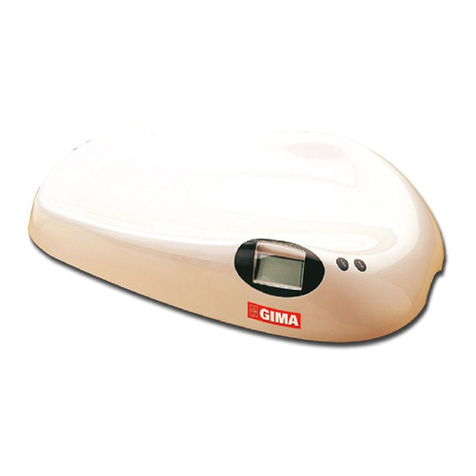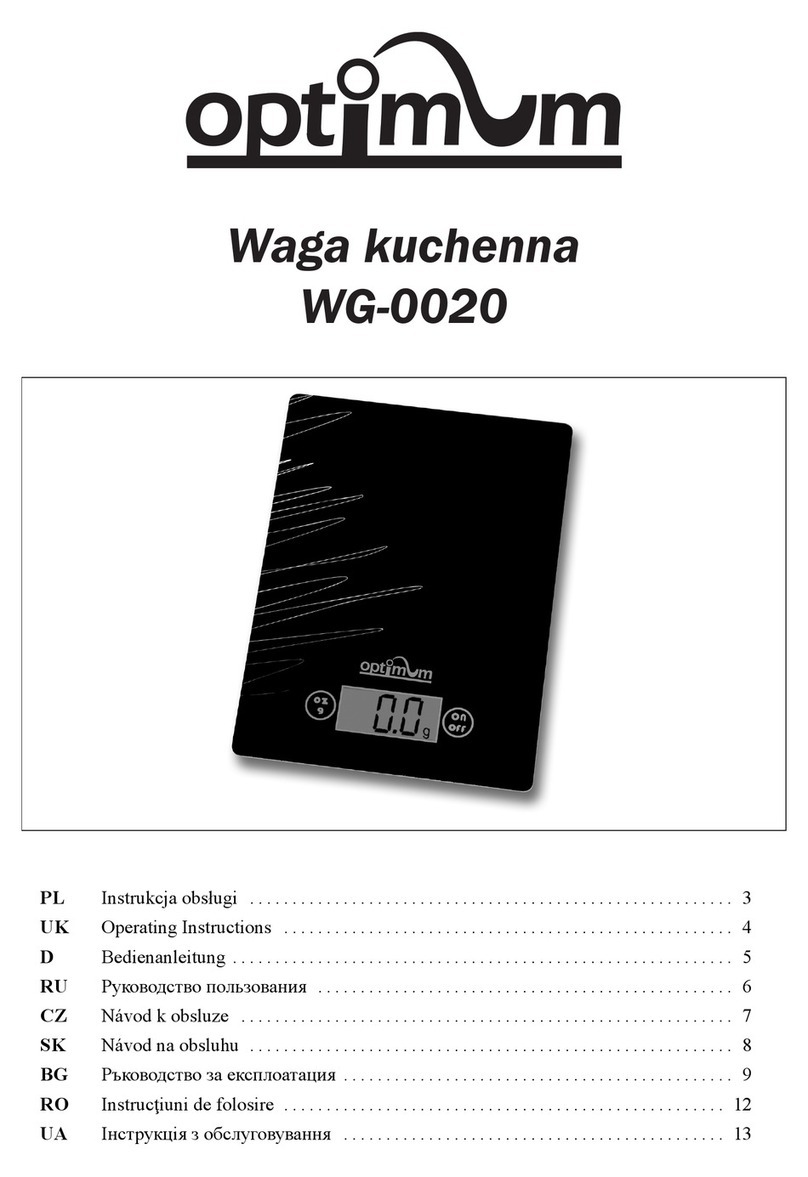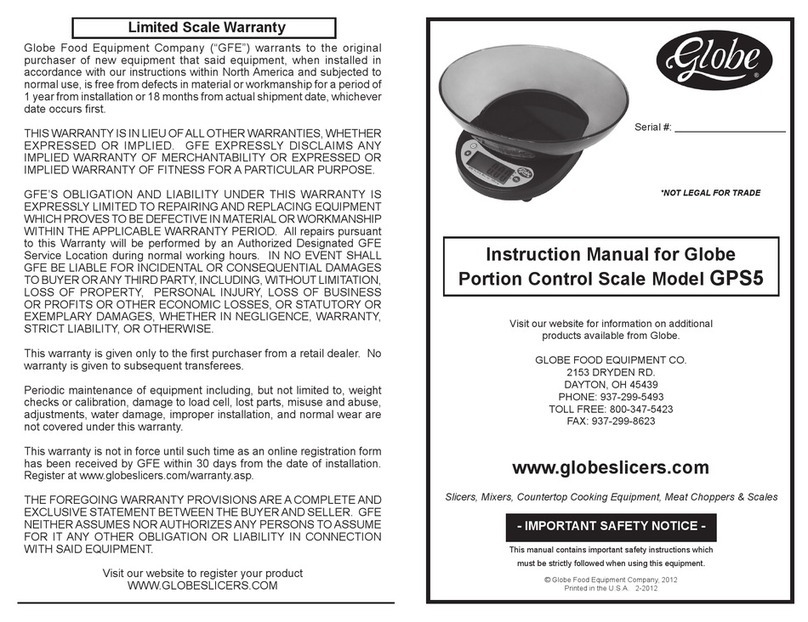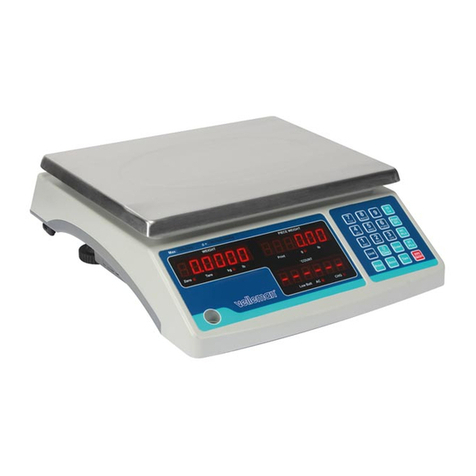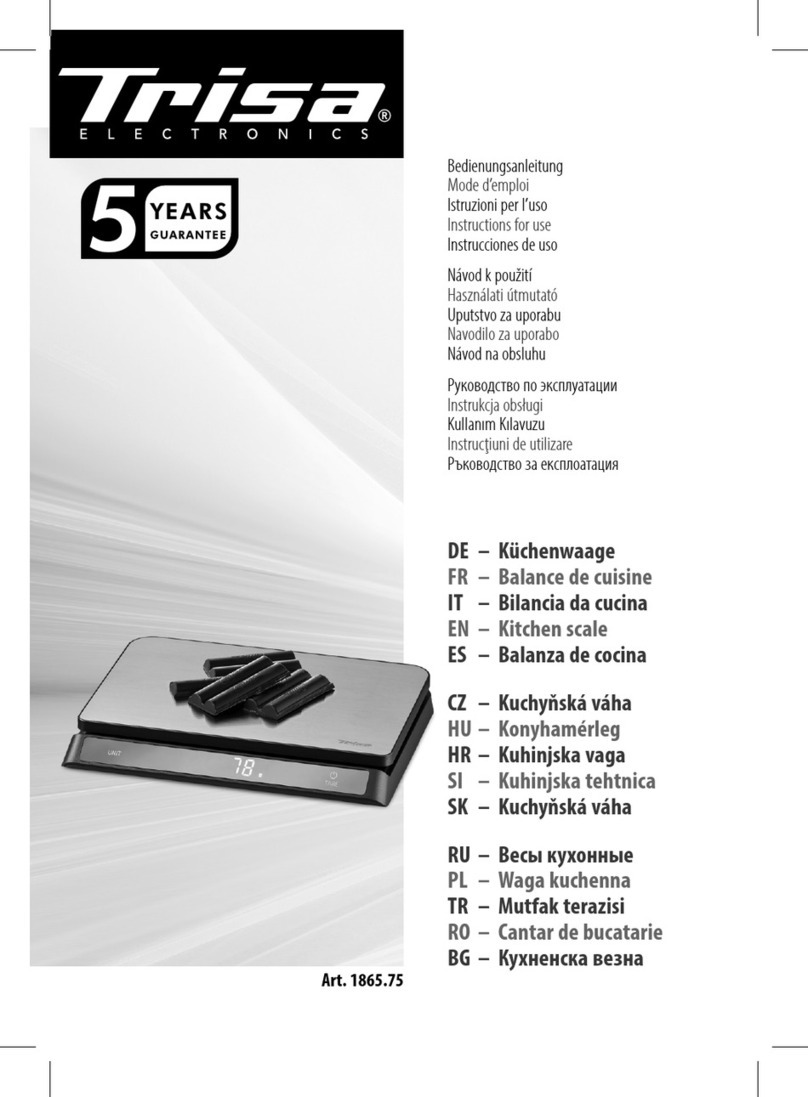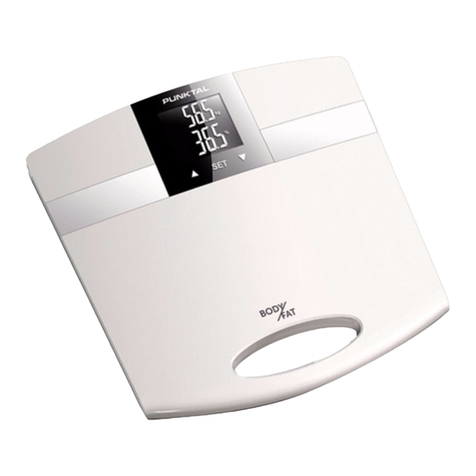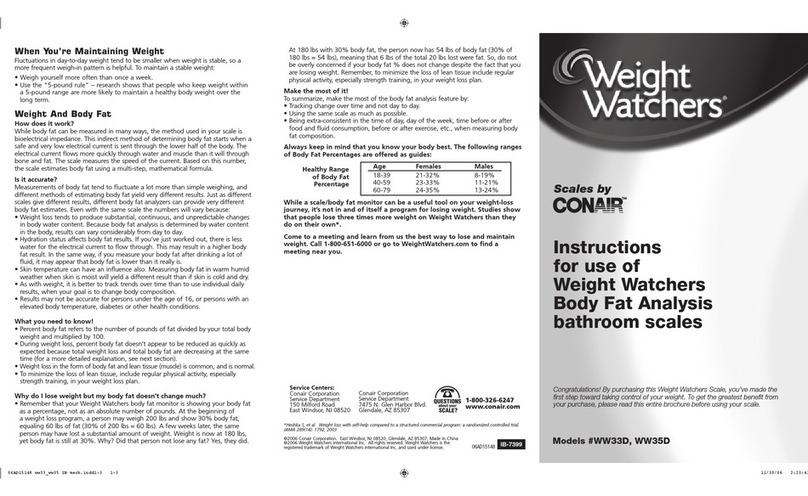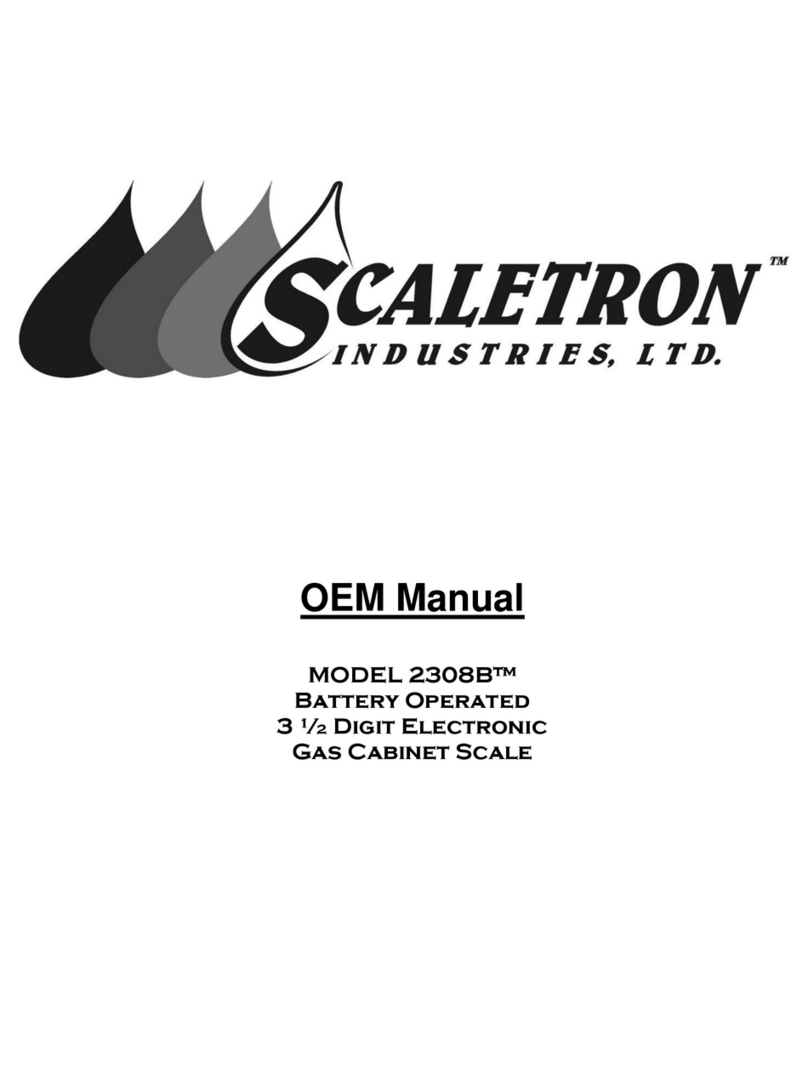Elicom Electronic EVLplus T User manual

Elicom Electronic Ltd.
Electronic Scales
E V Lplus
Models T and M
User’s Manual
Table of Contents Page
1. Warranty card .......................... 3
2. Brief description ...................... 5
3. Main functions ......................... 5
4. Technical data.......................... 5
5. Scale Overview ........................ 6
6. Preparing for use ..................... 7
7. Installation instructions........... 8
8. Operation modes ..................... 8
8.1. Weighting Mode............... 9
8.2. Counting Mode .............. 19
8.3. Labeling and Pre-labeling
Mode .............................. 20
8.4. Service Mode ................. 22
8.5. Connecting with external
devices........................... 30
8.6. Error Mode..................... 31
9. ЕO Declaration of conformity 32

Scale Models Series EVLplus
EVL+ xx LТ3 EVL+ xx LМ6
EVL+ xx BТ3 EVL+ xx BМ6

Elicom Electronic Ltd.
1. Warranty Card
MODEL NAME: Electronic Scale ELVplus
DATE OF PURCHASE…………………………
SERIAL №…………………………………
LIMITED WARRANTY
The warranty period for the Electronic Scale is 12 months from the day of the purchase. To
obtain and receive warranty service, you need to present the original Owner’s Manual along
with Warranty Card in any authorized dealers and services.
In order for the warranty to be valid, the product shouldn’t be opened; all stamps, lead seals
and company logos on the scale should be untouched from any mechanical damages.
Product damages should not be caused by any improper use of the scale.
The warranty does not apply if:
1. The electronic scale has been opened or repaired by unauthorized services by
Elicom Electronic Ltd.
2. The product does not operate correctly because of mechanical damage caused
by improper use: damaged keyboard foil, broken display, mechanical hit or
overload of the weighing platform or the load cell.
...................................
(Date) Dealer: …………..…………….
(Signature)
Customer: ..................................
(Signature)


Electronic Scale – models EVLplus хх LМ1, BM1, LT1, BT1 5
2. Brief Description
The electronic scales from series EVLplus xx LM, LM, LT, BT, are precise measuring
devices for determining the weight of goods in retail stores and warehouses.
All scales from series ELVplus are designed to work in temperature range from -10°C to
+40°C and to work without external power supply for up to 100 hours.
The scales provide accurate measurement, user-friendly reading indicators from a double
sided digital LCD indicator, automatic price calculation, automatic Zero set and Tare functions.
All the scales are equipped with interface RS232 for connection with other external
devices such as PC, cash registers, labeling printers.
3. Main Functions
Weight determination of the weighed products
Input of the price per 1 kg
Storing data for price, Tare, name, expiration date and est. of more than 2,000
articles
Displaying the information for the weight, price per kg and total value of the product
on two widow displays one for the user and one for the customer
Redirecting the information to PC, cash registers, label printers
Sound signals
4. Technical Data
4.1. General data for scales from series EVLplus
1. Dimensions: 380 х 300 х 129 mm
2. Shipping weight: 5 kg
3. Display:
For models LM, LT:
o Operator’s: LCD - 6 positions, 3 lines
o Client’s: LCD - 6 positions, 3 lines
For models BM, BT:
o Operator’s: LCD - 6 positions, 3 lines – 1 peace
o Client’s: LCD - 6 positions, 1 line – 3 peaces
4. Classified Accuracy
According to the Bulgarian State Standard EN
45501:2001
5. Error Limitations according to the Bulgarian State Standard EN 45501:2001
6. Number of check divisions: n = 3,000
7. Working Conditions
- Power Supply: - Built-in battery 6 V / 5 Ah
- AC adapter ~ 220 V / ~ 14 V
- Maximum Power Consumption: < 4 VA
- Operating Temperature: -10°C to +40°C
- Air Humidity: 20 % to 80 %
- Air Pressure: 84 to 107 kPa
- Safety Requirement – according to Bulgarian State Standard 14374-84
III

Owner’s Manual
6
8. Metal platter
- Size 300 х 250 mm
4.2. Technical data for all models
Model Maximal
Load
Minimal
Load
Maximal Tare Value of the real
check division e=d=
EVL+ 3 3 kg 20 g minus 3 kg 1 g
EVL+ 3/6 3/6 kg 20 g minus 6 kg 1/2 g
EVL+ 6 6 kg 40 g minus 6 kg 2 g
EVL+ 6/15 6/15 kg 40 g minus 15 kg 2/ 5 g
EVL+ 15 15 kg 100 g minus 15 kg 5 g
EVL+ 15/30 15/30 kg 100 g minus 30 kg 5/ 10 g
EVL+ 30 30 kg 200 g minus 30 kg 10 g
Model External
display
Total number of keys on
the keyboard
EVL+ xx LT1 Yes 34
EVL+ xx BT1 No 34
EVL+ xx LM6 Yes 33
EVL+ xx BM6 No 33
5. Scale Overview
5.1 Overview
Fig.1
5.2. Description
9
8
7
3
6
1
4
2

Electronic Scale – models EVLplus хх LМ1, BM1, LT1, BT1 7
1. Base - plastic base with four adjustable legs
2. Metal Platter - the measured loads are placed on top
3. Plastic lid cover - covers the electronic unit and the load cell unit. It protects the
keyboard, operator’s (8) and customer’s (7) display.
- The following information is also placed on the cover
- License registration
- Indications for state control
4. Leveler - for the scales to be horizontally placed adjust the legs (5) till the bubble in the
leveler indication stabilizes in the middle of the readout.
5. Adjustable legs - to level the scales by screwing them in both directions.
6. Keyboard - to enter price indication and to choose preliminary set prices.
7. Customer indication - to indicate the weight of the goods, price per kg and total price.
8. Operator’s Indication
9. Interface RS232 to connect with cash registers, PC or labeling printers.
5.3. Stamps and Lead Sealing
The scales from series EVLplus –xx LM, LT, LT, and BT have ЕО certificate for approved type
and correspond with the “Regulation for the main requirements and the measure of quality for
scales with non-automatic operation”
According to the requirements in appendix 8 from the Regulation, on the left side of the
scales is placed a label with serial number, meteorological characteristics of the scale, CE
logo for correspondence and the year of which the valuation for correspondence was done.
The scales are also stamped with two lead seals against unauthorized opening and
disassemble.
6. Preparing For Use
Before installing the scale is necessary to inspect the device for any mechanical damages
that may have occurred during the transportation. After the inspection is done the scale is
ready for installation. Place the scale onto horizontal surface. Level the scale by using the 4
adjustable legs at the bottom of the scale. Turn the legs clockwise or counterclockwise so the
bubble of the leveling gauge is inside the indicated circle which is located on the front left part
of the scale.
After the scale is properly placed for work, normal working conditions should be provided:
Operating Temperature -10°C to +40°C
Air Humidity 20% to 80%
Power Source 220V
Power Source Frequency 50 Hz
DO NOT plug the AC adapter in any power source different from the 220V/50Hz!!!
Avoid overload of the scale with weights greater that the specified Maximal Load!

Owner’s Manual
8
7. Installation Instructions
1. Open the box and pull out the contents, including:
- Scale
- Metal platter
- AC adaptor
- Operation Manual
- Passport
- Warranty card
2. Installation of the metal platter – place the tray legs in the corresponding holes on the
upper side of the scale. Sway it gently until it finds a stable position.
3. Place the scale on a flat surface (table). Level the scale by screwing the adjustable legs
and constantly keep an eye on the bubble in the left side indication. Once the bubble is
stabilized in the middle of the black circle, the scale is ready.
4. Plug in the AC adaptor to the main supply. The battery should obligatory be switched
on.
5. Turn On the scale by pressing the ON/OFF button. After this operation an automatic
check is performed on all the indicators by indicating all the figures from 0 to 9.
Wait for 10 minutes before using the scale.
Turn Off the scale by pressing the ON/OFF button and turn off the adaptor.
6. Avoid the following working conditions:
- Rapidly changing temperature
- Direct sunlight
- High percentage of dust and air humidity
- Windy places
- Vibrations
7. Don’t leave the scale loaded for a long time
8. Avoid placing the scales near magnetic fields or near devices generating
electromagnetic fields
9. Avoid penetrating of moisture into the scale units.
10. Avoid hitting the scale
8. Operation Modes
The scale operates in two major modes: “Weighting” and “Service”.
Both modes are managed by the keyboard.
Model: LT, BT

Electronic Scale – models EVLplus хх LМ1, BM1, LT1, BT1 9
Model: LM, BM
8.1. WEIGHING Mode
Place the load and wait till the scale stands still or until the indication for total price or the
load indication blinks repeatedly.
8.1.1 Keyboard keys
1. ON/OFF – Turn on/off the scale. Turn off with this button lessens but doesn’t stop the
energy supply from the adaptor. It’s recommended to unplug the adaptor from the main
supply once the work is done.
2. Zero setting ( >0< )– it is used for setting zero to the load indication if due to external
conditions /temperature change or leveling/ the readout is not zero when no load is
weighted.
3. Button Tare ( T )– it is used for entering tare value. The load, which is currently being
weighted, is considered as tare. The load indication is set to zero and the scale starts
indicating net weight, which is marked by a NET icon. If a load lighter than the Tare is
being weighted, it leads to negative tare value displaying the “Т” sign. The “NET”
pointer goes out. At that moment the preset Tare value can be set to zero by pressing
the T button. When the buttons 1/10 , 2/11 , … are used to call out the preset
article prices, the relevant tare values, set in connection with the prices, will be ignored
if a tare value is preliminary set by pressing the T button.
When a tare load is placed on the scale / and either the T button is pressed or the
tare value is called out by pressing the article buttons/, the readout indicates the Net
weight. If then the T is pressed a five-second indication will show the Tare weight
and will blink out after that.

Owner’s Manual
10
4. Keyboard keys 00 , 0 , 1 , 2 , 3 , 4 , 5 , 6 , 7 , 8 , 9 , C .are
used in the Weighing mode for entering article prices. Wrong figures are deleted by
pressing the C button and the price setting starts from the beginning. These buttons
are also used to call out the previously set article prices. In this case only two figures
are entered after which the PLU button is pressed and the figures are considered
as article numbers: 01, 02...89, 90…..1925
5. Article keys. They are used for calling out previously set article prices and tare weight.
For some scales an additional option is provided which allows for an article price to be
called out. For example pressing the 3/12 button will call out the price for the article
with number 3 . If before that the
is pressed then the button 3/12 will call out
the price for the article with number 12.
6. Button PRN - for printing information.
7. Functional buttons.
- PRG - double press switches from Weighing to Service mode
- CP - switches from Service to Weighing mode
8.1.2. Weighing an article and calculating the price using the keyboard
After the scale is switched ON by ON/OFF several automatic checks are performed. After
a zero indication is shown the scale is ready for operation. A pointer points to “>0<” for a tare
value.
A load is placed on the metal platter and the
readout indicates the value of the weight.
No price per kg is entered and the second
indication is still zero.
Enter the price by using the numeric keyboard.
For example: Keys 2 , 8 , 0 .
____.__
____.__

Electronic Scale – models EVLplus хх LМ1, BM1, LT1, BT1 11
If the price is wrong it can be deleted it by
pressing the C key.
Correct the figures by entering 2 , 5 , 0
The total price is calculated and indicated.
Remove the load from the platter – in the Price
per kg field remains the last price entered.
The field for TOTAL remains blank until the load
is under the minimum load for the scale
Note: When the load is less than the minimal (see the “Min” label on the front panel) the scale
does not calculate “Total price”.
.
8.1.3. Weighing an article using previously set price
The article is stored under number 3 and no Tare is considered (for example oranges)
The load is placed. By using the PLU key
3/12 call the price. The total price is
calculated according the PLU price. If the
desired PLU number is between 10 and 18 (for
example 10) press DW /
followed by the
1/10 key. In all other cases the number of
the PLU is called by using the numerical
keyboard followed by the PLU key.
In the “Total price” field is shown the calculated
value.
__
____.__
____
___

Owner’s Manual
12
If there is a previously set Tare for PLU 3. The
Tare will be deducted from the load and only
the net weight will be indicated. The “NET” sign
shows that there is a previously set Tare for the
corresponding PLU and only the net weight is
shown.
After the load is removed the Tare is shown with
a negative sign and the “T” symbol is shown in
the left part of the display.
8.1.4. Weighing an article considering Tare value (for example oranges in a pot)
The pot or other object for Tare is placed on the scale.
The display shows the weight of the pot.
Press the T key. Now the weighed load is
considered as a Tare. In the first line of the
display is shown the Net weight. It is shown by
the NET symbol in the top left part of the display.
Т
__
N E T
__
N E T
__
____.__

Electronic Scale – models EVLplus хх LМ1, BM1, LT1, BT1 13
Enter price per kg of 3.00 (Example) and
remove the pot.
After the pot is removed the scale shows the
weight of the Tare with a negative sign and the
„Т” sign in the top left part of the display.
After the pot is full, it is placed on the platter
The display shows the net weight of the
weighed product with the total price calculated.
The “NET” sign shows that the scale works with
Tare and at the moment is shown the net
weight.
During a loaded scale the value of the Tare is
displayed by pressing the T key for about 5
seconds, after that the scale shows the net
weight.
To work with accumulating Tare see Note 1
below!
Т
___ __
N E T
__
Т
__
N E T
__

Owner’s Manual
14
The Т key is also used to clear the Tare
value. To clear the Tare, the scale must be
unloaded.
Note 1: The following steps are performed for accumulating of the Tare value:
1. Set the Tare and place the first product as described above.
2. Press the T key, the scale shows the current Tare.
3. Press the T key for a second time – the scale zeros the Tare and shows the total
weight
4. Press the T key for a 3rd time – the scales accepts the current load for Tare
Note 2: If a Tare is set with the Т key, the call of an article with previously set Tare
doen’t change the weighed tare.
8.1.5. Accumulating totals / customer’s bill
Note!!! This option is factory disabled. To activate this function use service menu 2 (see 8.4.2)
To use the customer’s bill option (register of sales), perform the following steps:
8.1.5.1. After the first article is weighed and the total price is calculated, the item is stored by
pressing the + (followed by a sound signal).
An arrow shows that in the customer’s bill is
recorded a sale
Place the second article and enter the new price.
The sale is recorded by pressing the + .
___
__
__
Т
__

Electronic Scale – models EVLplus хх LМ1, BM1, LT1, BT1 15
To add a number of fixed price articles to the
customer’s bill (For example: 6 onions by 0.25
each). C , 6 press the * - This
combination is used to set the number of peaces
sold.
Enter the price by pressing the 2 , 5 keys.
Press the + to add the sale to the customer’s
bill.
8.1.5.2. Accumulated totals to the client’s bill.
By pressing the MR the scale is switching in mode to view the Customer’s Bill.
By pressing the MR repeatedly all the
accumulated totals in the customer’s bill are
indicated
In the middle line of the display is shown a
blinking mode “1—2” – it means that 1 of 2 sales
are displayed with price per kg of 2,10 for this
particular sale.
___
totAL
-Р- _
___
__ _
___ __

Owner’s Manual
16
With the MR are reviewed all of the sales
recorded in the client’s bill.
To go back to “Weighing Mode” press the “C” or “CP” keys.
8.1.5.3 To delete a particular sale, choose the desired sale by pressing MR .To delete
press the MC key two times. When deleted the display shows the previous sale.
___
-Р- __
___
totAL
___
-Р- __
___

Electronic Scale – models EVLplus хх LМ1, BM1, LT1, BT1
17
To delete sale #1:
Use the MС and MС keys to delete a sale. After the delete is shown the next sale in the
client’s bill. The total number of sales is now 1.
8.1.5.4. To delete a Customer’s bill. Press MR to go to the following screen:
Use the MС and MС keys to delete all sales
and the Customer’s bill.
After the delete is completed the scale is going to
normal mode as a sign that the client’s bill is
clear.
8.1.5.5. Note!!! When reaching 15 sales with the + key, the scale automatically switches
in a mode of displaying Client’s bill. Press the MC key to exit the Client’s bill and to
continue work.
8.1.6. Register of Sales
When using the functions of Client’s bill (see 8.1.5) exit the mode (see 8.1.5.4). The Client’s
bills are accumulated in a “Register of Sales”. In the register are accumulated the different
programmable articles (from 1 to MAX). The goods sold with manually entered price are
accumulated in a cell (article) MAX+1.
Note!!! The sales of articles with fixed price per unit are stored in the register only as an
amount, the number of these articles in not accumulated and stored.
____.__
totAL
___
___
-Р- __
___

Owner’s Manual
18
8.1.6.1. When sale is completed, press the MR to go to the “Register of Sales”. The first
screen shows the totals: weight and turnover of all clients’ bills.
To go back to WEIGHING MODE use the C or CP keys
On the first line is shown total weight, on the
bottom line is shown the total turnover at the
moment.
Use the MR key to switch the articles on
which there are accumulated sums.
To clear the “Register of Sales” press the MC
key two times, when the “Register of sales” mode
is entered.
When the register is cleared, a CLEAr sign is
displayed followed by a sound.
The number of the PLU is cleared at this
moment.
°
__
__
°
__

Electronic Scale – models EVLplus хх LМ1, BM1, LT1, BT1 19
8.2. COUNTING Mode
8.2.1 Activating from Service mode 2. Press PRG, DW after that press the PRG key
rapidly till the “cnt 0” is shown on the display. By pressing the C key from the numeric
keyboard change the blinking „0” to „1” .Press СР to exit.
8.2.2 Before you start work, place an exact number of details, you want to count and
define their exact number. For the next weighed details, this particular load will be
used to define their exact number. It is recommended that the number of the first
weighed details is with mass е > 1/3 of the maximum of the scales.
For example: If the maximum for a particular scale is 3 kg then the number of the
details weighed should be at least 1 kg.
The 3 concepts are entered:
1. Basic number of details – this is the number of details which are used to calibrate
the counting function.
2. Basic weight – the weight of the “basic number of details”
3. Tare – tare of the package or the pot which is used during the counting.
8.2.3 Work with PLU and previously set data for the details
The 3 concepts explained above need to input via PC for each article PLU, in order for the
scale to work properly.
For the PC you need to use the “Article’s parameters” in “parameters COUNTING” mode:
1. From Weighing mode double click PRG to go to PL1925, where 1925 is the
maximal number of articles of the scale.
2. Use the „+” key to change PLU001.
3. On the line below is displayed “Basic number of details”. Changing the number is
done by the numerical keyboard.
4. If Tare is used – Place the object used for Tare and press „Т” to set the Tare.
5. Press the „CH”, to switch to “Basic weight” mode.
6. On the “Price per kg” line is displayed: „base” and “neto”, on the “weight’ line is
displayed the set Basic weight or the current weight of the load placed on the scale.
7. Place the “Basic number of weight” (p.3) on the scales and when the weight is set,
press the “T” key. The weight of the details is sat as a “Base weight”.
8. By pressing the „CH” key you can go back to the “Basic number of details” and
Tare.
9. To save the changes press the „+” key and you switch to PLU002.
10. To go to specific PLU press “PLU” – the PLU000 is displayed and the displayed
number is entered by the numeric keyboard followed by the “PLU” key.
Perform the following steps
1. Turn on the scale, after all tests are performed double click the „СР” key.
2. On the middle line is displayed „.0”, on the “Weight line’ is displayed „0.000” and
„base”
3. By using the numerical keyboard, enter the desired PLU number: Example: 800200
followed by the „PLU” key.
4. On the first line of the display will be displayed the set Tare or „0.000” if there is no
set Tare. On the middle line is displayed „base” and the value for „Basic number of
details”

Owner’s Manual
20
5. Place the desired number of details. On the “Total Price” is displayed the number of
the details blinking text „count”.
8.2.4 Work without PLU
Perform the following steps
1. Turn on the scale, after all tests are performed double click the „СР” key.
2. As a result on the middle line of the display is shown „0”, on the weight line is shown
„0.000” and „base”
3. Place the “Basic number of details” and enter their number by the numeric keyboard.
The entered number will be displayed on the “Price per unit” line.
4. By pressing the PRG key, the number and the weight are set and the scale is in
“Counting mode” of the details
5. In the middle line the „base” text and the value of the „Basic number of details” is
blinking.
6. Place the desired number of details. On the “Total Price” is displayed the number of
the details blinking text „count”.
8.3. Labeling and Pre-labeling Mode
8.3.1. Labeling! To work with a label printer, the labels and the articles (PLU) need to be
previously unloaded in the scale. This is done by using: Label editor and Parameter editor
software offered by the manufacturer. Depending on the memory and the modification is
possible to set the following data for each article (PLU): price, tare, name (up to 6 lines),
article number, expiration date. Additional information can be set: 3 different consignment
numbers, counter number, operator’s number. The scale has a clock for real time, which can
be also presented on the label or used for calculating the expiration date of the product.
Perform the following steps:
1. Turn on the scale by pressing ON/OFF
a. The scale performs all tests and weights the tare.
b. Turn on the printer
2. Method of work
b
count
b
This manual suits for next models
1
Table of contents
Other Elicom Electronic Scale manuals
Popular Scale manuals by other brands
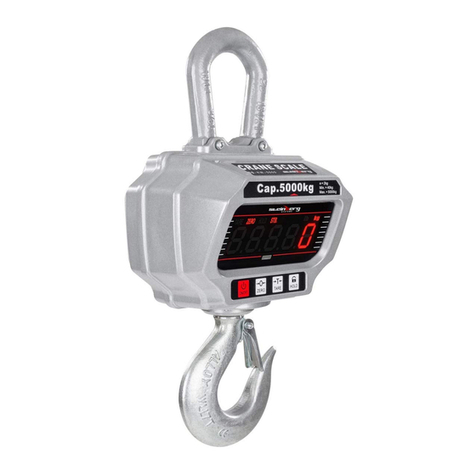
Steinberg Systems
Steinberg Systems SBS-KW-3000 user guide

HoMedics
HoMedics SC-465 Instruction manual and warranty information
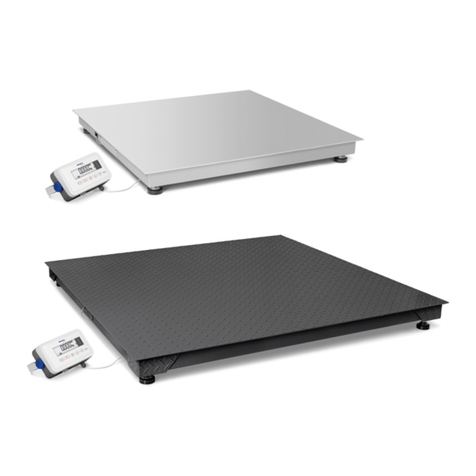
Minebea Intec
Minebea Intec Puro EF-4P operating instructions
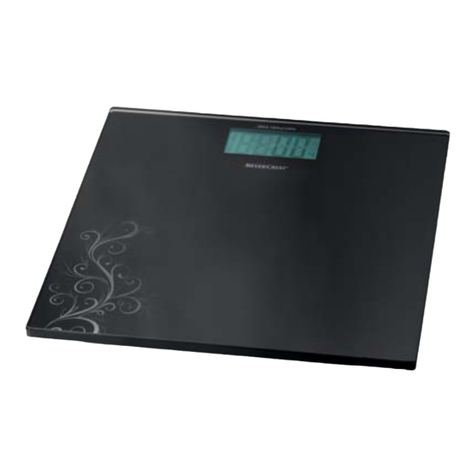
Kompernass
Kompernass KH 804 operating instructions
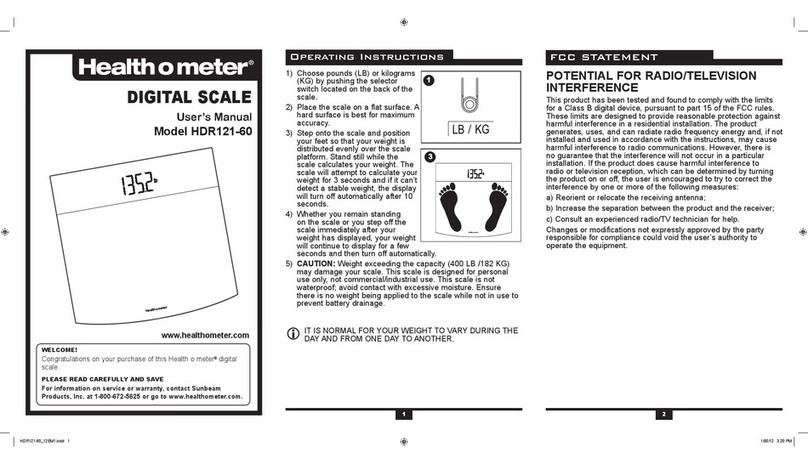
Health O Meter
Health O Meter HDR121-60 user manual
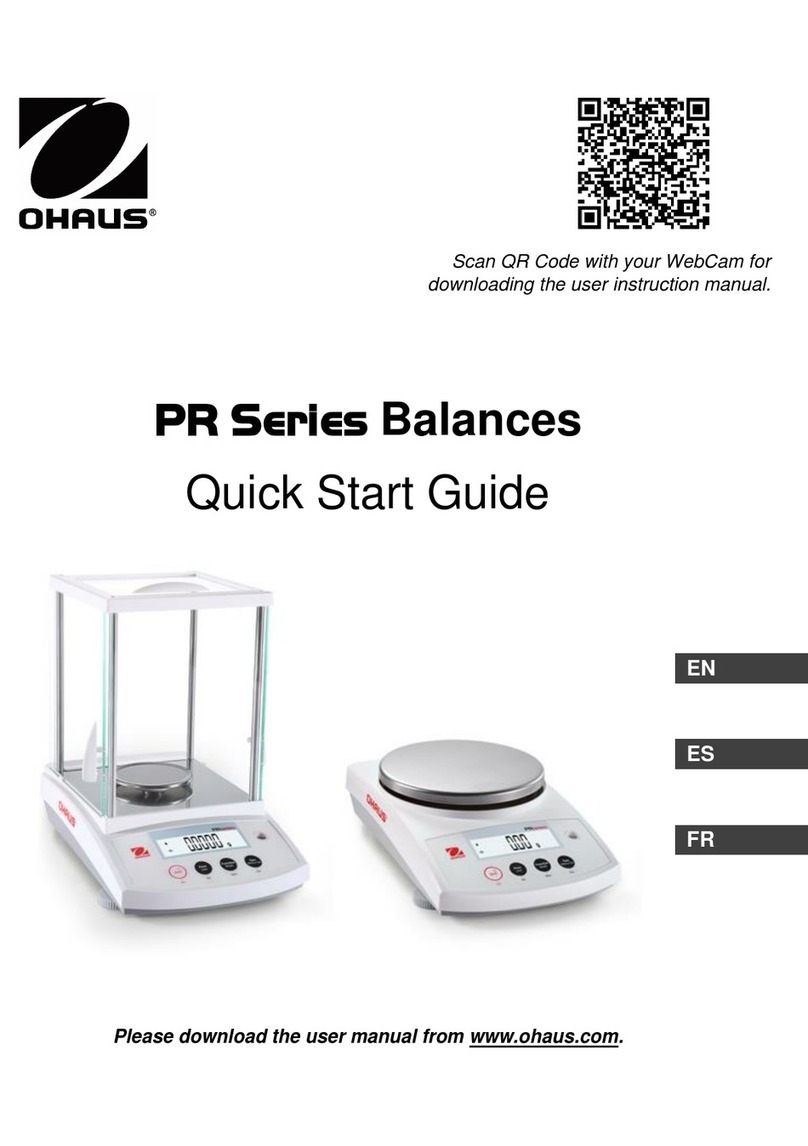
OHAUS
OHAUS PR Series quick start guide


